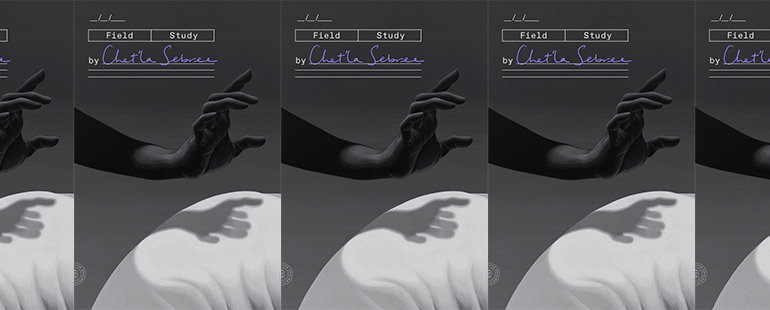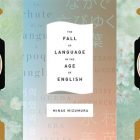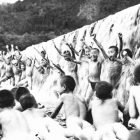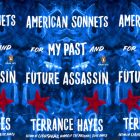Poetry of Data, Poetry of Experience

The formal draw of sentences organized into patterns of line and stanza—or those poems that might reject lineation, complete sentences, and regular stanza—often has very little to do with information. A poem’s subject matters tremendously, yet these patterns of organization, the way the language is arranged, are frequently what compels us to return over and again to the poems we love. Feeling this sometimes-nameless enchantment when we read, a poem becomes a record of the experience its language enacts through its subject—and through our experience of reading it. Chet’la Sebree’s Field Study, a book-length prose poem published last week, panics at the difference between quantifiable data and truth, on the page, in a poem: “Field research is the collection of observational information. Approaches vary across disciplines,” she writes. Field Study collects observations and memories—and certainly one can easily transform notions of “approach” and “discipline” into ideas of “prose poetry” and “genre”—yet it’s not the data collected that reveals any particular truths about, or through, this book. What is revealed, what parts of a life are represented, are done so through the process of its own telling.
The raw data, the facts that first command the need for a more extensive study, are as follows: a Black woman remembers, mourns, and investigates from the present tense her past relationship with a white man. Outward from the facts of this relationship, Field Study accumulates distinct webs of meditation on love, misogynoir, and American history: a punchline from Ali Wong transitions into the rhythmic pulse of deep pleasure, a brief memory of a sexual encounter, then three lines from Natasha Trethewey. It’s through this high-speed accumulation that Field Study announces the purpose for its own making—as if the book needs to rationalize, in the most excruciating moments of remembering, its own vulnerability:
In his dissertation, Ross Gay states ‘this
study . . . blends my love of literature with my
desire to understand my own subject position
and my own family history in relation to
American’s historical preoccupation with
Interracial desire.’ It prompts my own
investigation.
When a question designed for a dissertation is asked throughout a poem, one may find a sense of the answer in the question being asked, the way the “investigation” is restated and reframed; poems don’t have conclusion chapters, though they might include codas. Just as prose suits this book’s anxiety of genre, of categorical understanding and information, these are the unlineated sentences of a poem all the same: when the inflections of a line have been removed, readers who experience these words are asked to listen even more attentively to the rhythms of a sentence.
Field Study is a story told in revolutions, the narrative turning over and forward while referring to observations made pages earlier, like notetaking. Different parts of the whole disappear then return, and the pattern in which details reoccur is understood as the poem adapts to the memories, ideas, and facts as they’re spoken. “I’m a mess of genres—for which there are no nouns of assembly”—and while there are no “nouns of assembly,” there are verbs. Because time passes across the book’s story, because time passes as we read these pages, the abbreviated sections adopt ever-changing roles in asking questions, and with ever-changing results. Sections may affect the specter of impersonal reportage: “Note: This is an investigation of the effects of the world on one woman’s desire and identity formation.” Such “notes” may seem like a professional aside at first, or a private imperative for oneself—yet the quality of fact-minding helps the speaking voice persuade herself into confessions of high-lyricism:
I want to be palm raw and hip-bone sore.
I want it on the bed, on the floor, in the back of
my ’02 Honda Accord.I want his fingertips to smooth over me
slowly—fingerprint and follicle in holy union.
This is how Field Study strips the ornaments of a staged performance, a poem that resists a sort of allegorical moralizing: because these sections adapt to experience as represented in-process, one feels these are sentences written in real-time, immediately as we encounter them on the page.
How the sections of Field Study adapt in real-time comes, in part, through qualifications and rebuttals; how qualifications and rebuttals contribute to one’s sense of this poem happening is the book’s obsession with fact and truth, their differences. “These percentages are as fake as fake news but this fact is not: white people see whiteness as universal.” For the reporter of these statistics, it doesn’t quite matter whether they’re factual—“The Women’s March meant a lot to a lot of women in my life. By a lot of women in my life, I mean the 53% of my friends that are white”—but it matters that they’re the truth. Poems are usually not considered statistics or evidence, so beyond factual analysis, what truth might one uncover in the arrangement of this poem? Imagining how one can answer this question, in this context and through this book, depends greatly on the obsessions and temperament of the speaking voice:
My mom was a chemist, so I’ve learned to
say shit just for the reaction, learned the
importance of the quantitative:I’ve been with ten men—six Black, four
white.But remember I’m not good at math, that not
all of these are facts.
The word “math” and the notion of a quantifiable emotional life reappear throughout this book—this may communicate something that isn’t quite field-specific: the need for memory, for pain, to seem measurable when it feels insurmountable. “With you, I was seven hundred and thirty-three shards of smashed glass, how many times we had sex according to my math.” When the speaking voice quantifies these memories, when that experience suddenly becomes not-infinite and human, her body transmutes into other material: knowing and fact ostensibly lead to a figurative change. Field Study, with its rebuttals and corrections, confesses that using such data and information as a supposed corrective to our emotional lives is not sustainable: “Let’s be honest, I’ve fudged some of this math.” The substantive figurative change, this prose poem tells us—the direct gaze into one’s inner life—arrives when the book cannot substitute algebra—the desire for a quantitative cause-and-effect—for the experience of emotions, both chaotic and orderly. The same section continues, sentences later, “I’m not sure about which I’m more concerned: the fact that I’m zero for three or the imbalance of this weighting,” and just like that, uncertainty turns us to the process of asking and answering the implied question in the first place.
This effort toward accepting indeterminacy—both a formal knowledge and a semantic impulse—charges Sebree’s figurative thinking with a lyrical precision: metaphors here do not approximate the evidence that one has lived in a specific place at a specific time. Rather, they become the fact itself. The truth. For this reason, and despite the admission “I’m a mess of genres,” one immediately recognizes these sentences as unlineated poetry. How we categorize this language will not change what makes it powerful, but it does change what one expects from notions of “truth” and “fact”:
Note: In the contract for this, I promise not to
write anything materially inaccurate.I tell my agent this a fiction.
Can you tell what I’ve changed to protect you?
Me?
What I’ve altered for the sake of poetry?
Impossible knowledge is presumed and excluded from this book; becoming aware that knowledge exists inaccessible to us is altogether more necessary to realize than the knowledge itself. What is emphasized in the absence of information, of data? Something that’s not as easily named or quantified: how the arrangement of these sentences formally demands our attention, and, in doing so, how these words enact a specific experience in the present tense, upon our reading. Sebree writes in another self-addressed section, “Note: What is truth in poetry? What exists in the gaps?” However else one might try to answer these questions, one understands through this book that “truth in poetry” depends not on the record of information but on experience: a life represented in metaphor, the patterns of language that make a time-signature through which we listen.



